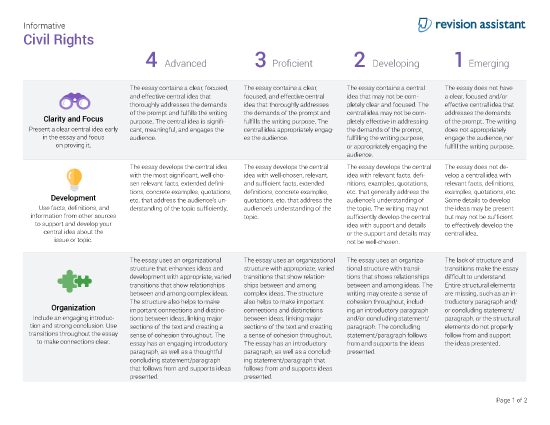Grades 9-10 | Informative | Text-Dependent
Source Lexile®: 1430L-1550L | Learning Standards
Prompt
Write an essay in which you compare and contrast the methods proposed in both passages below to improve the economic conditions of African Americans during the 1960’s. In your essay, use evidence from both texts to identify which of the perspectives makes the most convincing argument for improving economic conditions.
Source 1
Along with the march as a weapon for change in our nonviolent arsenal must be listed the boycott. Basic to the philosophy of nonviolence is the refusal to cooperate with evil. There is nothing quite so effective as a refusal to cooperate economically with the forces and institutions which perpetuate evil in our communities.
In the past six months simply by refusing to purchase the products from companies which do not hire Negroes in meaningful numbers and in all job categories, the Ministers of Chicago under SCLC’s Operation Breadbasket have increased the income of the Negro community by more than two million dollars annually . . .. This is nonviolence at its peak of power, when it cuts into the profit margin of a business in order to bring about a more just distribution of jobs and opportunities for Negro wage earners and consumers.
Source: Dr. Martin Luther King, Jr., “Nonviolence: The Only Road to Freedom, May 4, 1966,” Ebony (October 21, 1961).
Source 2
. . . (W)e have to learn how to own and operate the businesses of our community and develop them into some type of industry that will enable us to create employment for the people of our community so that they won’t have to constantly be involved in picketing and boycotting other people in other communities in order to get a job.
Also, in line with the economic philosophy of black nationalism, in order for us to control the economy of our own community, we have to learn the importance of spending our money in the community where we live . . .. (W)hen you take money out of the neighborhood in which you live . . . the neighborhood in which you spend your money becomes wealthier and wealthier, and the neighborhood out of which you take your money becomes poorer and poorer.
. . . (W)e haven’t learned the importance of owning and operating businesses . . . so even when we try and spend our money in the neighborhood where we live, we’re spending it with someone who puts it in a basket and takes it out as soon as the sun goes down. So the economic philosophy of black nationalism puts the burden upon the black man of learning how to control his own economy.
Source: Malcolm X, quoted in George Breitman, The Last Years of Malcolm X: Evolution of a Revolutionary, 1967
Rubric

 This work is licensed under a Creative Commons Attribution-NonCommercial 4.0 International License.
This work is licensed under a Creative Commons Attribution-NonCommercial 4.0 International License.